|
|
|
Sort Order |
|
|
|
Items / Page
|
|
|
|
|
|
|
| Srl | Item |
| 1 |
ID:
164651
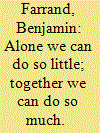

|
|
|
|
|
| Summary/Abstract |
This article demonstrates the role and importance of EU agencies in the EU’s regulatory environment, and considers the consequences of an absence of cooperation through agencies for internal security. It does so by exploring the case study of the anti-counterfeiting activities of the European Union Intellectual Property Office (EUIPO), and what happens when a state no longer benefits from membership of an EU agency. The effective protection of consumers from counterfeit goods is dependent upon identifying best practices, sharing information on counterfeiting trends, and coordinating responses, activities undertaken through EU agencies. This article demonstrates that the ability of states to effectively counter the sale of counterfeit goods is dependent upon the existence of EU agencies due to the need for transnational cooperation. In the absence of EU agencies, states are likely to suffer diminished operational expertise and a lack of in-depth knowledge concerning counterfeiting trends. It concludes that the EU agencies form an essential part of EU security governance, with states not party to these cooperative endeavours rendered vulnerable and unable to combat at a national level what is ultimately a global problem.
|
|
|
|
|
|
|
|
|
|
|
|
|
|
|
|
| 2 |
ID:
164652
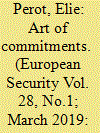

|
|
|
|
|
| Summary/Abstract |
Law and politics are the two constituent parts of a collective defence architecture. In Europe, such an architecture currently rests on a series of legal commitments: NATO’s mutual defence clause (Art.5 of the North Atlantic Treaty), but also the EU mutual assistance clause (Art.42.7 TEU) and the EU solidarity clause (Art.222 TFEU). Many asymmetries exist, however, between those legal clauses: they are often overlapping but not always identical with respect to their respective conditions of activation, territorial scopes, binding strengths, and modalities of implementation. Because of those legal asymmetries as well as prevailing political realities, there are many obstacles in fact to a clear-cut division of labour within Europe’s collective defence architecture between NATO and the EU. In Europe, collective defence should thus not be apprehended as a uniform task but rather as the art of balancing multiple legal and political constrains, come what may.
|
|
|
|
|
|
|
|
|
|
|
|
|
|
|
|
| 3 |
ID:
164655
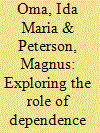

|
|
|
|
|
| Summary/Abstract |
Dependence has been demonstrated to be a main factor driving small states’ alliance contributions. However, the causal pathway linking dependence on the one hand, and small states’ contributions on the other, is seldom explicated and assessed. Furthermore, the ways in which dependence may shape, not only drive, such contributions, have received little attention. The purpose of this article is to elaborate the role of dependence in these regards. Drawing on Glenn H. Snyder’s “fear of abandonment” concept, it is argued that reputation is the main mechanism linking dependence and contributions. The article specifies the causal pathway and assesses it against case-study evidence of Norway’s and Sweden’s military participation in ISAF. The process tracing lends much support to the proposed mechanism, and comparison helps clarify how different alliance relationship status (member or partner) impacts on the theorised causal chain.
|
|
|
|
|
|
|
|
|
|
|
|
|
|
|
|
| 4 |
ID:
164654
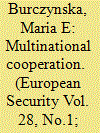

|
|
|
|
|
| Summary/Abstract |
European air power is represented by a variety of air forces, each equipped with different capabilities and facing different limitations. Developing the former and making up for the latter requires resources and finances and is not always possible within a national capacity. It may be particularly problematic for smaller air forces, especially with the trend of shrinking defence budgets and increasing costs of the newest technological achievements. This article investigates the idea of multinational cooperation in Europe as a way to make up for these shortfalls and build collective European capabilities. In doing so, it focuses on two states, namely Poland and Sweden as examples of small air forces. By choosing these countries as case studies it also provides an opportunity to investigate the different forms of multinational involvement existing within and outside a major military alliance, namely NATO. The article explores the participation of the Polish and Swedish Air Forces in several multinational initiatives and investigates how such involvement increases (or not) their capabilities.
|
|
|
|
|
|
|
|
|
|
|
|
|
|
|
|
| 5 |
ID:
164650
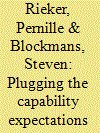

|
|
|
|
|
| Summary/Abstract |
Since the entry into force of the Lisbon Treaty in 2009, the European Union (EU) has spent considerable time and energy on defining and refining its comprehensive approach to external conflicts. The knock-on effects of new and protracted crises, from the war in Ukraine to the multi-faceted armed conflicts in the Sahel and the wider Middle East, have made the improvement of external crisis-response capacities a top priority. But has the EU managed to plug the capability–expectations gap, and develop an effective, comprehensive and conflict sensitive crisis-response capability? Drawing on institutional theory and an approach developed by March and Olsen, this article analyses whether the EU has the administrative capacities needed in order to be an effective actor in this area and implement a policy in line with the established goals and objectives identified in its comprehensive approach.
|
|
|
|
|
|
|
|
|
|
|
|
|
|
|
|
| 6 |
ID:
164653
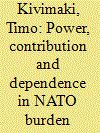

|
|
|
|
|
| Summary/Abstract |
This article offers three new types of variables for computation of the share that NATO countries should contribute to the common defence. I use Uppsala conflict data (UCDP) on conflict participation to reveal how the asymmetry in power that allows the US to define most of the framings on which NATO’s utility calculations are based, compensates for the greater material contribution made to NATO by the US. Then I follow Ringsmose’s model of NATO burden sharing and create two types of variables crucial to the calculation of burden sharing. One reveals the share of US military protection aimed at protecting its NATO allies. The other measures how much US global security efforts against tyranny and terror are dependent on NATO allies. These two variables are developed by means of computer-assisted discourse analysis of US Presidential Papers. The three new variables contribute to a more complex mathematical model on fair burden sharing, indicating at the same time that the imbalance between US and allied contributions is declining. If European allies have ever exploited the United States in the past, then at least the relationship has become more even during the past two decades.
|
|
|
|
|
|
|
|
|
|
|
|
|
|
|
|
|
|
|
|
|